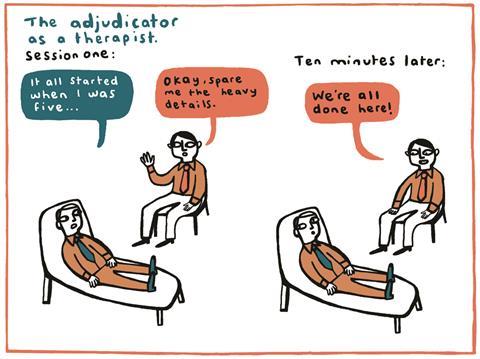If you don’t think an adjudication should take place, don’t just go ahead with it - either press pause or get out altogether
Stephen Smith of Underground Pipeline Ltd has been quarrelling for 10 years with Carillion Construction Ltd about the construction work at Broadgreen Hospital, Liverpool. The first adjudication was in 2002; second 2003; third two months ago. Carillion baulked at the third. It said that it was the same dispute as run in the second. The adjudicator rejected all that and pressed on. He awarded Mr Smith £800,000. Carillion came to court. It argued that the adjudicator ought not to have pressed on.
A little bird told me that no clear agreement to pause reached this adjudicator. My bet is that if it had, he would have stopped. And it would have saved fees
It’s a short question. Is this the same dispute? Here I pause. I am going to show you the real difference between adjudication and litigation. The judge, Mr Justice Akenhead, took 40 hours to analyse the 10 lever-arch files of information he received and write up the judgement on that question. So, here we have a very experienced construction industry barrister and new senior judge in charge of the Technology and Construction Court spending a week of his time fathoming in detail, in depth, the answer to that one question. That is what litigation is about. And I doubt anyone else would have been quicker, and I doubt anyone else would have been any more accurate in the answer. But the real point is that the same question was put to the quantity surveyor adjudicator … the question that needed at least 40 hours of judge time and likely much more QS time. That is not what adjudication is about. It is not a replacement for litigation. It is not a rehearsal for litigation. The adjudicator is not to act as should an arbitrator or judge. He is not there to find the “right” answer. The timescale of the adjudication is proof of that. He has no time for a deep dig; he can only achieve a light probe. Put it this way, if the answer is blindingly obvious, so be it. If the point is fiercely arguable, complicated, expect rough justice. You get an answer in 10 minutes; not 40 hours of judge quality.
And I go further. The decision of the adjudicator is a waste of 10 minutes time anyway. It will almost certainly be a non binding “mere observation” decision about the adjudicator’s own right to stay. Without both parties plain agreement to decide his own fate the adjudicator is, in law, biased because he has an interest in staying put. So let’s count up the pros and cons of raising what we call a “threshold jurisdiction” challenge, ie the right to adjudicate with the adjudicator. The only pro is that the adjudicator will resign immediately if the point is overwhelmingly plain enough to stop. If it is arguable, the adjudicator will not budge. And if you think your arguable case to stop is so good, then you stop. Yes, you. Put your feet where your argument is. Don’t take part. Risky? Yes; arguable points go either way. And if meanwhile the adjudicator proceeds without you, the likelihood is that the award will go against you. And if you are right after all this the award will not be enforced and you will not be liable for the adjudicator’s fee. But if your jurisdiction point was wrong, you left an open goal for your opponent. The other tactic is to persuade the adjudicator to pause with the adjudication while you and your opponent litigate the jurisdiction point. In this Carillion and Smith case it is said that notwithstanding party and party agreement to do this, the adjudicator was not bound by that agreement and pressed on. A little bird told me that no clear agreement to pause reached this adjudicator. My bet is that if it had, he would have stopped. And it would have saved fees if he had. The reason is that the analysis by the judge agreed with Carillion; this was a re-run of the dispute all those years before. So the adjudication, and the £800,000, is not enforceable.
Without both parties agreement to decide his fate the adjudicator is biased because he has an interest to stay put
So, what is the test for finding out if this is a re-run dispute and barred? The test is to ask “whether the same or substantially the same” dispute has been referred to or resolved in an earlier adjudication. What does this mean in practice?
Ask what is the ambit and scope of the disputed claims. New evidence, expert opinion or argument do not usually alter the dispute. New or better calculation of money is no new dispute; neither is greater detail. Notices of adjudication and referral notices are not definitive documents. It is however legitimate to enquire into what motivates a party to bring a later adjudication. I am not sure what the implications of that remark might be. Perhaps the reason is fraud or mischief in the previous adjudication. That might re-open the gate. Might.

Tony Bingham is a barrister and arbitrator at 3 Paper �ڶ�����s Temple



























No comments yet